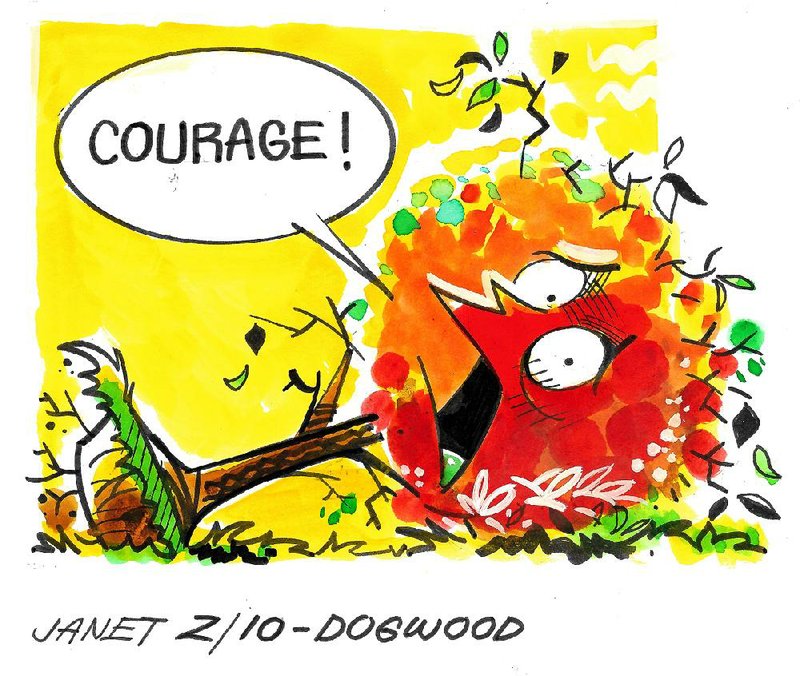Q I have a dogwood that was blown over last spring and is still alive. Its leaves stayed green all summer and it has set buds this fall/winter. It is half in and half out of the soil, leaning at a sharp angle. Most likely I will remove it, however I wonder if all or part of it could be saved in some form. I haven't tried yet and suspect it may not be achievable easily, but what is your opinion on righting the tree from its current state? If not feasible, could I cut off all but a few feet of the trunk, then right it and "replant"? Or might I be able to root a new tree from a young limb in a pot or "plant" a current branch as it lies, then remove the main tree after the branch roots?
A Dogwoods are not the most resilient trees. Once wounded they often linger for a few years and then die. This one seems to be half uprooted as well. I would get the roots in the ground as soon as possible. I would think any that have been exposed this long are damaged already. If it were mine, I would toss it and start over, but if you want to try, cut it off near the ground, replant it, covering up the roots; then see if it begins to grow. If it does, choose the strongest sucker it produces to be the new tree. If it is in a focal spot, this will take awhile, so you might be better served simply buying a new tree.
Q The dead, brown bermuda grass in my flower bed is very visible this time of year since all the flowers have frozen out. Is there a way I can treat the bermuda in order to rid the bed, or does one just need to dig it up as best they can? I know the roots are still alive although the grass tops are dead.
A Unfortunately, nothing will be effective in killing bermuda grass while it is dormant. If you can use a hoe and get all that is visible out or hand pull, you can put a dent in it for the coming season, but thinking that will kill it all is wishful thinking. If you can, monitor it in the spring. There are grass-specific herbicides (Poast, Grass-b-gone, Over the Top, etc.) that do a good job killing grass in flower beds, but you need to let the grass get actively growing and just beginning to run before you attack it.
Q I have a gardenia in the front yard that looks like it has really been damaged by the cold weather. My husband wants to cut it back now, but I know you have said that the flowers are on it when it goes into winter. If he cuts it back, will I get any blooms?
A At this point, I would tell him to hold off on pruning. For two reasons. One, we can all hope that any damaged foliage is just that -- burned leaves, and that the new leaf buds and flower buds are still intact. We will only know that once growth begins in the spring. Secondly, we have at least another month (or six weeks according to the groundhog) of potential winter weather. If it is pruned now, and we do have severe cold weather, you have lost the protection of damaged wood that stands between tender good wood and the cold, and you may wind up needing to prune back further. You are not alone in seeing some damaged landscape plants, but wait a bit longer to begin pruning. If you do have to prune it way back, flowering will be greatly reduced.
DEAR READERS: Several people have written in trying to register for the Azalea 101 workshop 8 a.m. to 2:30 p.m. April 5 at the State Extension Office that I wrote about a few weeks ago. Depending on the browser you use, the shorter link may not have worked. If you would like to register, try this link: www.lrmeetings.com/ungerboeck/emc00/register.aspx?OrgCode=20&EvtID=5436&AppCode=REG&CC=117121426516
The $45 fee includes all course material, educational programs and lunch. If you need more information, let me know.
TIP: If you know of a graduating high school senior who plans to major in horticulture or related field, applications are being accepted for $1,000 Janet B. Carson College Scholarships from the Master Gardener Advisory Board County 76. The deadline to apply is March 10. Applications and more information are at uaex.edu, search for Carson scholarship, or try this link: bit.ly/2nJPwa4.
Janet B. Carson is a horticulture specialist for the University of Arkansas Cooperative Extension Service. Write to her at 2301 S. University Ave., Little Rock, Ark. 72204 or email her at
jcarson@arkansasonline.com
HomeStyle on 02/10/2018
